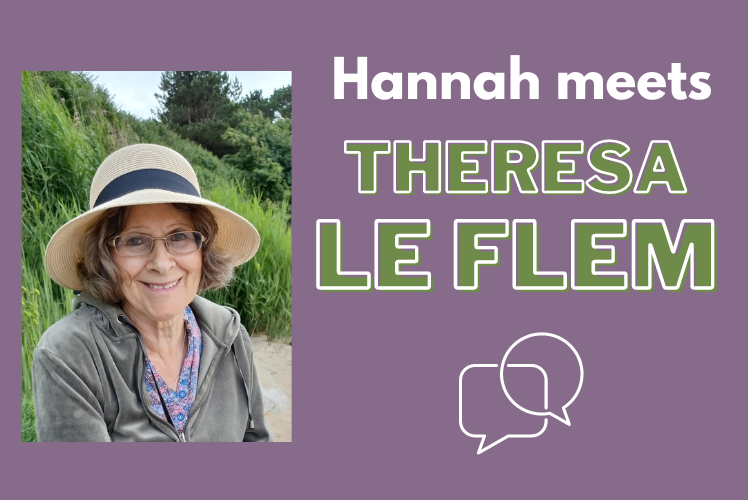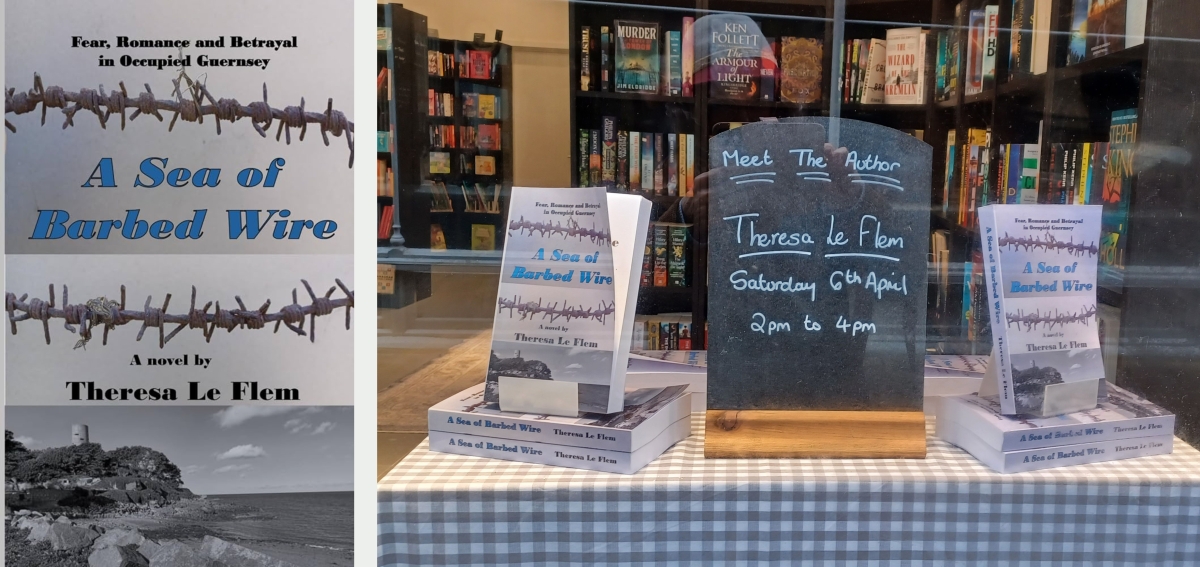
Library Assistant Hannah is passionate about books and reading. In the latest in her series of author interviews, Hannah chats to author Theresa Le Flem.
A poet and fiction writer, Theresa has written four novels exploring social history, human relationships and love. Born in London, Theresa now lives in Guernsey with her husband. Her fifth novel, A Sea of Barbed Wire, was released in March this year.
Centred around the blossoming love story between Ellen, a local girl, and Lukasz, an escaped Polish prisoner of war, A Sea of Barbed Wire is a romantic, atmospheric page turner set against the backdrop of the German Occupation in Guernsey.
-----------------------------------------------
Hannah: I read that it took you three years to write A Sea of Barbed Wire – it was very well researched, and I could picture the places mentioned vividly. How did you go about researching it?
Theresa: I had stacks of books from both local libraries on my table. I also spoke to a few people who were children during the Occupation, and they told me some interesting things. A lot of people who were alive at that time don’t want to talk about it, which I do understand. My Dad was a prisoner of war for three years, and he never really talked about it.
There’s a lot in the book that, despite being raised here and knowing our history, I simply hadn’t thought of before. For example, how weak people felt, just from walking due to having no food. Was there anything in your research that really surprised you?
When I was with my first husband, we had three young children to feed, and times were tough, so that hunger and anxiety over food really resonated with me. If I finished a jar of jam, I used to put it back in the cupboard so it wouldn’t look so bare!
One of the things that surprised me the most was that Guernsey people spied on their neighbours and reported back to the Germans for extra food, or cigarettes. If you couldn’t trust your neighbours in that time, who could you trust? I understand why they did it, people will do anything to stay alive, of course. But it did surprise me. I also learned that the locals would speak Patois so the Germans couldn’t understand them, which is something I did want to include in my book but couldn’t find the right way.
Before I met my husband, who’s local, I didn’t even know the history of the Channel Islands, so this was all very new to me, and very interesting! We moved here about four years ago, but we met about twenty-five years ago.

I’m very much like you in that I love to write and was thrilled to write essays at school. Do you have any tips for aspiring writers trying to get published?
Don’t give up! I started writing seriously about twenty years ago and had a couple of short stories published in Women’s Own and People’s Friend. Although I tried, I’ve never had an agent. After sixteen rejections of my first book, The Sea Inside His Head, I though, “Blow this for a laugh!” and went to a publisher called Robert Hale, it was a small family business. They agreed to publish my novel within two weeks. It was put in Waterstone’s and libraries, so well worth doing. Unfortunately, the business closed before I released my second novel.
I’ve published three books independently since then – I think it’s important not to dismiss independent publishers; you can learn a lot, and you have more control over your book as well. Rejections can be soul destroying, so publishing independently is a good option, and regardless of how you choose to go about getting published, you have to promote your work.
Do you plan your stories, or do your characters take over?
My characters definitely take over. I’ve never been one to plan my stories, I just let the characters take me on the journey and see where we go. I’ve never had writer’s block, so it works for me. I’ve also had loads of jobs, so I can draw on experience from many lines of work.
You’ve lived in a few places; London, Sussex, Essex, Cornwall, and now Guernsey – does the sea draw you in?
I think it does. I was born in London, my Dad was an artist and he wanted to join an artist’s community in St Ives, so we eventually moved there. Although, from what I remember, he didn’t really get on with the other artists, and my Mum had just been diagnosed with Rheumatoid Arthritis, so it was quite tough at first.
Who are some of your favourite authors?
I love the classics; Dickens, D.H. Lawrence; I love his passion! And Thomas Hardy.
Do you have any writing quirks, for example using a certain type of pen, or notebook?
I handwrite notes as and when I think of things, but otherwise I type everything up. I can’t imagine how Dickens wrote so much by hand, and by candlelight! We’re very lucky to live in an age where we can type fairly quickly. Before my husband retired, I used to start writing at around 9, and finish just before 5 so I could start preparing our tea. I’m not as disciplined now.
Do you have a library card?
Oh, yes! I don’t use it as much as I should; it’s an uphill walk home, which isn’t easy with a bag of books. I also love to buy books.
Want to read on? You can find all of Theresa's novels on the Library catalogue here.
